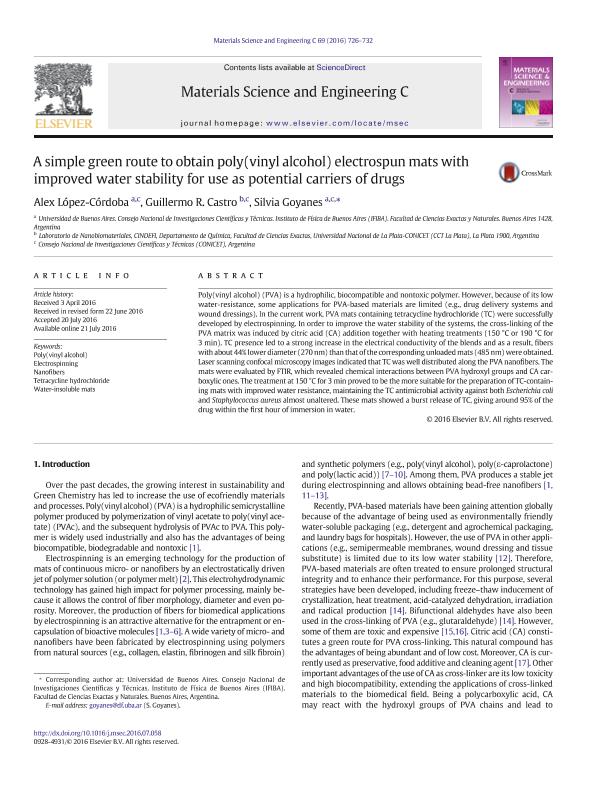Artículo
A simple green route to obtain poly(vinyl alcohol) electrospun mats with improved water stability for use as potential carriers of drugs
Fecha de publicación:
07/2016
Editorial:
Elsevier Science
Revista:
Materials Science and Engineering: C
ISSN:
0928-4931
Idioma:
Inglés
Tipo de recurso:
Artículo publicado
Clasificación temática:
Resumen
Poly(vinyl alcohol) (PVA) is a hydrophilic, biocompatible and nontoxic polymer. However, because of its low water-resistance, some applications for PVA-based materials are limited (e.g., drug delivery systems and wound dressings). In the current work, PVA mats containing tetracycline hydrochloride (TC) were successfully developed by electrospinning. In order to improve the water stability of the systems, the cross-linking of the PVA matrix was induced by citric acid (CA) addition together with heating treatments (150 °C or 190 °C for 3 min). TC presence led to a strong increase in the electrical conductivity of the blends and as a result, fibers with about 44% lower diameter (270 nm) than that of the corresponding unloaded mats (485 nm) were obtained. Laser scanning confocal microscopy images indicated that TC was well distributed along the PVA nanofibers. The mats were evaluated by FTIR, which revealed chemical interactions between PVA hydroxyl groups and CA carboxylic ones. The treatment at 150 °C for 3 min proved to be the more suitable for the preparation of TC-containing mats with improved water resistance, maintaining the TC antimicrobial activity against both Escherichia coli and Staphylococcus aureus almost unaltered. These mats showed a burst release of TC, giving around 95% of the drug within the first hour of immersion in water.
Archivos asociados
Licencia
Identificadores
Colecciones
Articulos(IFIBA)
Articulos de INST.DE FISICA DE BUENOS AIRES
Articulos de INST.DE FISICA DE BUENOS AIRES
Citación
López Córdoba, Alex Fernando; Castro, Guillermo Raul; Goyanes, Silvia Nair; A simple green route to obtain poly(vinyl alcohol) electrospun mats with improved water stability for use as potential carriers of drugs; Elsevier Science; Materials Science and Engineering: C; 69; 7-2016; 726-732
Compartir
Altmétricas




